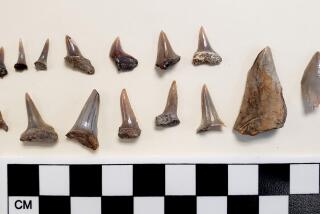A Shopping Mayday
- Share via
The Sea, a seller of seashells by the seashore since 1962, began as a place for co-owner Richard Williams to peddle the tables he crafted out of abalone shells. It grew into a mom-and-pop shop with an astonishing inventory.
“There are millions of things here,” says Lynne Hansen, manager for 18 years. “It’s incalculable.”
The Sea summons images of ancient mariners, shipwrecks, uncharted volcanic isles, Gauguin paintings. Located near Los Angeles Harbor in San Pedro, it smells wonderfully of sun-dried, salt-cured fishermen’s nets. A skeleton of a 40-foot finback whale, hauled north from Mexico via VW minibus 30 years ago, dangles by ropes from the ceiling. Out on the sales floor, browsers and serious collectors navigate through a vast maze of merchandise casually piled on shelves or heaped willy-nilly into old boats. Amazingly, a price tag appears on almost every item. A basketful of shells from the Philippines is $2.98. Fiberglass copies of taxidermic sharks or dolphins can cost thousands.
It’s all got to go before December, though, when Richard and wife Yvetta close up for the last time. Sorry to see them shove off into retirement will be nautical buffs, shell and fossil hobbyists, even marine biologists who come to hunt for evidence of species that may have vanished from local waters. Jewelry makers paw through bucket upon bucket of shells and corals, buying raw materials by the pound. And this is where interior designers can score sleek bones to anchor in handsome plexiglass display cases.
“There are people literally weeping” about the impending loss of the Sea, says Yvetta.
She has kept the store interesting by buying up the sometimes decades-old shell collections of sworn beachcombers and also by dealing with fossil hunters and divers, who bring up barnacle-encrusted urns and other debris from the bottom of the ocean. So, a Japanese signal flasher from World War II shares quarters with Greek fishermen’s caps.
As she watches customers cart away trunkloads of cuttlebones and fountains, Yvetta vows not to abandon San Pedro. “We were both born here,” she says. And here they’ll stay, spending more time with their grandkids and playing flamenco guitar.
More to Read
Sign up for The Wild
We’ll help you find the best places to hike, bike and run, as well as the perfect silent spots for meditation and yoga.
You may occasionally receive promotional content from the Los Angeles Times.






